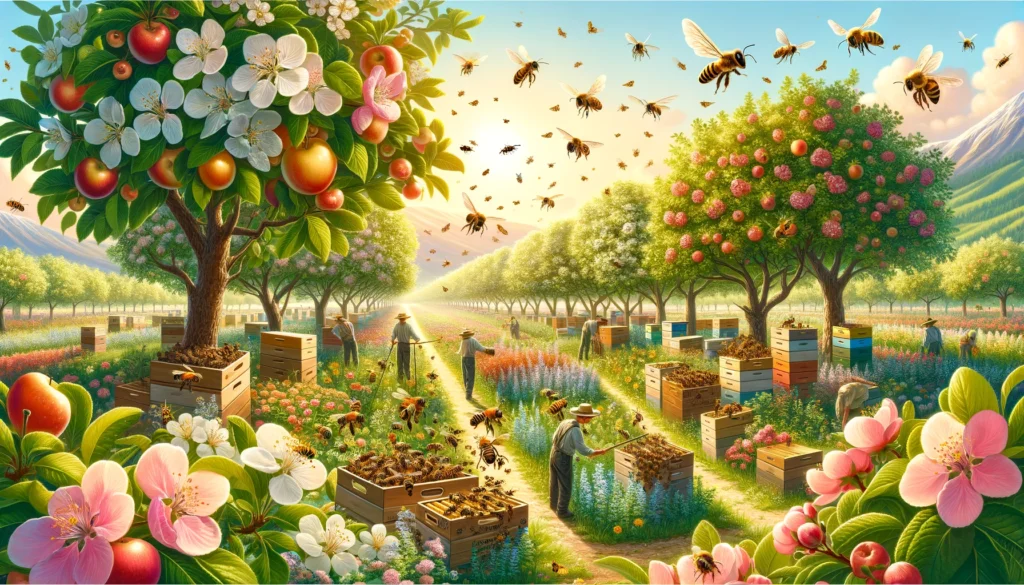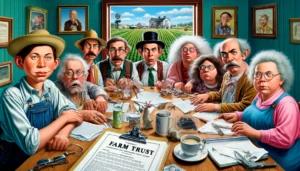
Pollination services A wide aspect vivid illustration of pollination services in agriculture. The scene depicts a lush orchard with various flowering fruit trees such as 2.webp.webp
Pollination Services: Nature’s Essential Contribution to Agriculture
Definition:
Pollination services refer to the vital ecological process by which pollen is transferred from the male reproductive organs (anthers) to the female reproductive organs (stigma) of flowering plants, leading to fertilization and the production of seeds and fruits. Pollination is primarily facilitated by pollinators, including bees, butterflies, birds, bats, and other insects and animals, which visit flowers in search of nectar and pollen, inadvertently transferring pollen grains between flowers as they forage.
Informative Details:
Pollination services play a fundamental role in the reproductive success of flowering plants, including many crops essential for human food production and ecosystem stability. Approximately 75% of flowering plants and about 35% of global food crops rely on animal-mediated pollination to some extent. Pollinators contribute to crop yield, quality, and diversity by ensuring efficient pollination and fertilization, leading to the production of fruits, vegetables, nuts, seeds, and fibers.
Fall off the barn roof and busted your keister? Life on the farm or ranch can be tough on the bum. Need a break? Laugh it off at FarmerCowboy.com, the #1 farm humor site. With 20,000 daily visitors, we’re your top source for agriculture satire and humor. Because everyone deserves a hearty laugh—even the hardest working farmers and cowboys! Join us and turn those long days into fun tales at FarmerCowboy.com.
Valuable Assistance:
Pollination services offer numerous benefits for agriculture, biodiversity, and ecosystem health, including increased crop yields, improved crop quality, and enhanced genetic diversity. Pollinators contribute to the resilience and sustainability of food systems by supporting the reproduction and productivity of economically important crops such as almonds, apples, blueberries, melons, and coffee. In addition to their agricultural value, pollinators play critical roles in maintaining natural habitats, supporting wildlife, and sustaining ecosystem services such as soil fertility, water purification, and carbon sequestration.
Beneficial Guidance:
Farmers, land managers, and policymakers can benefit from adopting pollinator-friendly practices and policies to support pollination services and enhance agricultural productivity and environmental sustainability. By promoting habitat conservation, reducing pesticide use, and providing nesting sites and floral resources for pollinators, stakeholders can create healthy and resilient landscapes that support diverse pollinator populations and ensure reliable pollination services for crops and wild plants.
Actionable Suggestions:
- Habitat Restoration: Restore and enhance pollinator habitat by planting native flowering plants, shrubs, and trees that provide nectar, pollen, and nesting sites for pollinators. Create pollinator-friendly landscapes, hedgerows, and buffer zones around agricultural fields, urban areas, and natural habitats to support diverse pollinator communities.
- Pesticide Management: Minimize pesticide use and exposure by adopting integrated pest management (IPM) strategies that prioritize biological, cultural, and mechanical controls over chemical pesticides. Choose bee-safe and pollinator-friendly pesticides, applying them judiciously and at times when pollinators are least active.
- Pollinator Education: Educate farmers, gardeners, and communities about the importance of pollinators and pollination services for food security, biodiversity, and ecosystem health. Offer training programs, workshops, and outreach events to raise awareness about pollinator conservation and provide practical guidance on supporting pollinator-friendly practices.
- Hive Management: Work with beekeepers and apiarists to ensure the health and welfare of managed honey bee colonies, which provide valuable pollination services to many crops. Coordinate hive placement, timing, and management with crop flowering periods to optimize pollination effectiveness and efficiency.
- Policy Support: Advocate for policies and incentives that promote pollinator-friendly agriculture and landscape management practices, including financial assistance, technical support, and regulatory incentives for farmers and landowners who adopt pollinator conservation measures.
Helpful Content for Stakeholders:
Pollination services are essential for agricultural productivity, biodiversity conservation, and ecosystem resilience, providing valuable benefits for people, pollinators, and the planet. By working collaboratively and taking proactive steps to support pollinator conservation and sustainable agriculture, stakeholders can ensure the continued availability of pollination services for future generations.
References:
- Pollinator Partnership – Link
- Xerces Society for Invertebrate Conservation – Link
- United States Department of Agriculture (USDA) – Link

Originally posted 2020-03-27 03:08:04.
Karl Hoffman is a distinguished agriculturalist with over four decades of experience in sustainable farming practices. He holds a Ph.D. in Agronomy from Cornell University and has made significant contributions as a professor at Iowa State University. Hoffman’s groundbreaking research on integrated pest management and soil health has revolutionized modern agriculture. As a respected farm journalist, his column “Field Notes with Karl Hoffman” and his blog “The Modern Farmer” provide insightful, practical advice to a global audience. Hoffman’s work with the USDA and the United Nations FAO has enhanced food security worldwide. His awards include the USDA’s Distinguished Service Award and the World Food Prize, reflecting his profound impact on agriculture and sustainability.




